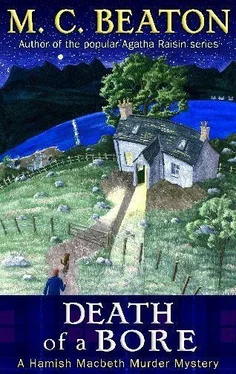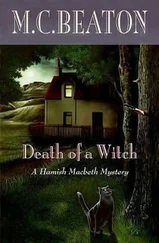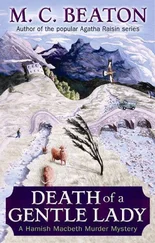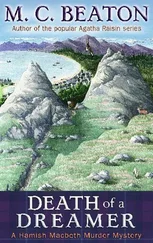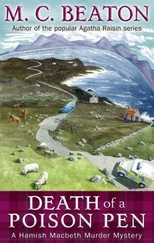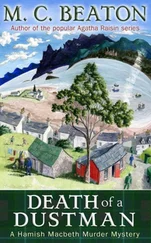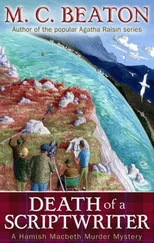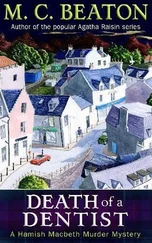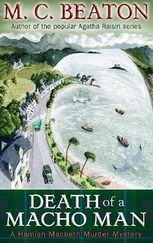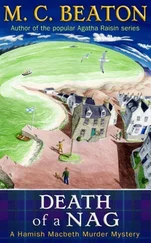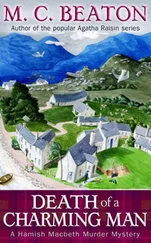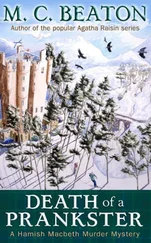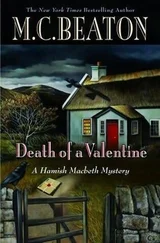“Don’t really watch it,” said Hamish. “It’s not very representative of life in the Highlands. We don’t get that much rape. Are you working on John Heppel’s script?”
“Yes. Harry Tarrant says we should do it in his memory. Your food’s getting cold.”
Hamish shovelled in two large mouthfuls and then asked, “You knew John, of course. How did you get on with the great writer?”
“I hardly spoke to him. He was a pain in the neck. He was always walking into the scene and shouting that it wasn’t faithful to his script. Paul always had to take him away and soothe him down.”
“Did he have any friends on the cast?”
“Maybe you should speak to Patricia Wheeler. She plays the honest crofter’s wife. They went around together.”
“Is she here?”
“No, she’s not in this part.”
“Listen up, everybody!” Paul Gibson stood at the entrance. “We can do the rape scene somewhere else before the locals lynch us. We’ll do the walking bits. Ann, I want you back on the beach. The first shots weren’t any good. You’ve to walk along singing to yourself and looking carefree. Cameron, you’ll be lurking behind the rocks.”
“There aren’t any rocks,” complained the actor who played the rapist.
“Then find something. We’d better get something out of this. The place is crawling with police.”
Hamish feared for the villagers. Heather must have given orders that they were all to be interviewed again.
He finished his breakfast and took Lugs back to the police station, which smelled strongly of carbolic soap and furniture polish. The women had left. He poured Lugs a bowl of water, locked up the station, and went back to the waterfront.
How many times did Paul expect Ann to walk along the beach? It seemed as if he was never going to be satisfied. At last he called, “It’s a wrap. Take a break.”
Hamish moved to the top of the steps leading up from the beach and accosted Paul Gibson.
“I would like a word with you,” he said.
“I could do with a drink,” said Paul.
“There’s a pub along by the harbour.”
“Good. We’ll go there.”
When they were seated, Hamish said, “You’re spending a long time over John’s script.”
“Well, we had to put it on one side and do another one last week.”
“But doesn’t the storyline follow one episode after another?”
“Yes, but the Heppel script was to be a one-off.”
“Might I see a copy of the script?”
“Why?”
“Might give me a clue.”
“Sally!” called Paul. Sally Quinn, the script editor, who had been standing at the bar, came over to them. “This copper wants to see a copy of John’s script.”
A look passed between them. “The one we’re working on?”
“Sure. John’s script. Give him a copy.”
She went back to where she had been standing and picked up a heavy briefcase from the floor and extracted a folder. She took out a script and brought it to Hamish, who thanked her.
He turned back to Paul. “You said you didn’t get on with John.”
“He was very excited about his script. He loved television.”
“I thought the only part of television he loved was getting his face on it,” said Hamish dryly.
“You’re unkind. He was difficult, but we all miss him.”
Hamish looked at the director with raised eyebrows. But perhaps John was so enamoured of television that he had behaved himself better than usual.
“Where can I find Patricia Wheeler?” asked Hamish.
“Why?”
“I gather she was friendly with John. You see, he might have said something to her about being frightened of someone who was threatening him.”
“We’re moving up to the forecourt at the Tommel Castle Hotel this afternoon. She’ll be there. Now, I’d better get back.”
Hamish began to read the script. It seemed very workmanlike. There were none of the pseudo-literary flourishes he would have expected from John.
He left the pub and got into the Land Rover outside the police station. From inside, Lugs gave a peremptory bark. Hamish unlocked the door. “Okay, you can come.”
He lifted Lugs up into the passenger seat, climbed in, and drove off up the road to the Tommel Castle Hotel. He wondered what the film people were using it for. He had only read the first part of the script. No doubt in these politically correct days, the villain would turn out to be some rich laird.
He left Lugs in the Land Rover and went into the manager’s office. “Is that literary agent still here?” he asked.
“He’s just arrived back. He keeps coming and going. He’s that excited about Alistair Taggart,” said Mr. Johnson. “Hamish, who on earth is going to buy a book in the Gaelic?”
“Beats me. Is he in the hotel?”
“Yes, I’ll phone him.”
Hamish walked over to the coffee machine and helped himself to a mug and then slid two biscuits for Lugs into his pocket.
“He’s coming down,” said the manager, replacing the receiver. “He says he’ll see you in the bar.”
Clutching the script, Hamish went through to the bar. Blythe Summer walked in. “What’s up?” he asked. “Nothing wrong with Alistair, is there?”
“No, not that I’ve heard. Why are you bothering so much about a book in the Gaelic?”
“It’ll catch the imagination. You’ve no idea how many classes in Gaelic there are in Edinburgh and Glasgow. I’m getting it translated. I think I’ll get a Booker Prize out of this one.”
“Good luck. I wanted you to look at this script. It’s supposed to have been written by John Heppel.”
“Must I? Never could stand either the man or his writing.”
“You knew him?”
“He wanted me to act as his agent. He sent me Tenement Days . I thought it was a load of rubbish. But he went ahead and got it published and got an award and then kept sending me nasty letters about how I had turned down Scotland’s greatest literary talent. Wait till I get a drink. I’ll need a stiff one if I’m going to read anything written by Heppel. What are you having?”
“I’ve still got some coffee. That’ll do me fine.”
Blythe bustled back with a large brandy and soda. He took a sip and then said, “Here goes.” He took out a pair of glasses and perched them on his nose.
Hamish waited patiently. He looked around. He could remember the days when the hotel was the family home of his ex-fiancee, Priscilla Halburton-Smythe. Her father, the colonel, had fallen on hard times, and Hamish had suggested to him that he turn his home into a hotel. The result was a success for which the colonel gave Hamish no credit at all. His favourite story was how the idea had come to him in a blinding flash.
Blythe cleared his throat and shook his head. “John Heppel never wrote this.”
“You’re sure?”
“Absolutely.”
∨ Death of a Bore ∧
9
When I am dead, I hope it may be said :
“ His sins were scarlet, but his books were read .”
—Hilaire Belloc
Hamish felt quickening excitement. Blythe rustled the papers. “They probably found they couldn’t work with his flowery prose and got someone to tighten it up and cut out all the waffle. This seems a very competent script. What’s it all got to do with his murder?”
“I wanted to read the original to get a better feel of the man’s character. But why are Paul Gibson and that script editor trying to cover up the fact that they aren’t using John’s script?”
“Why not ask them?”
“Oh, I will. Here’s trouble.”
Heather Meikle walked into the bar. “What are you doing here, Macbeth?” she demanded. “I told you to interview the villagers.”
“Police and detectives seemed to be already doing that, ma’am,” said Hamish meekly. “But there’s something interesting here.”
Читать дальше
